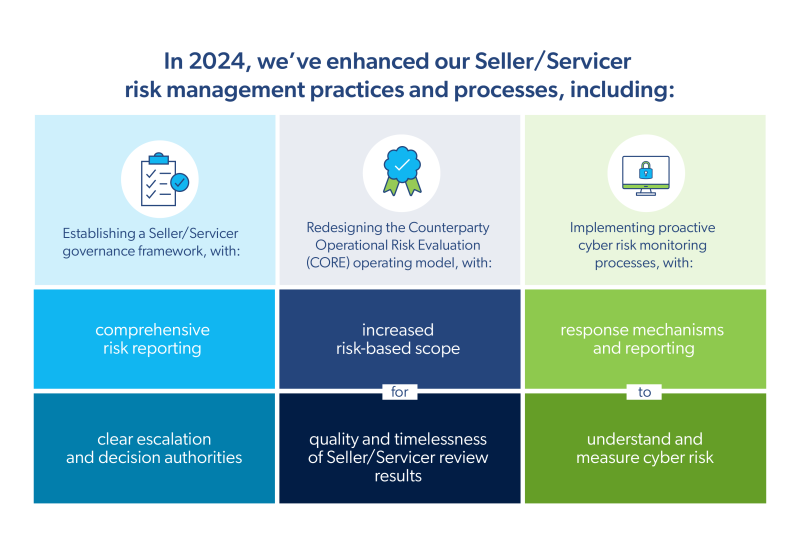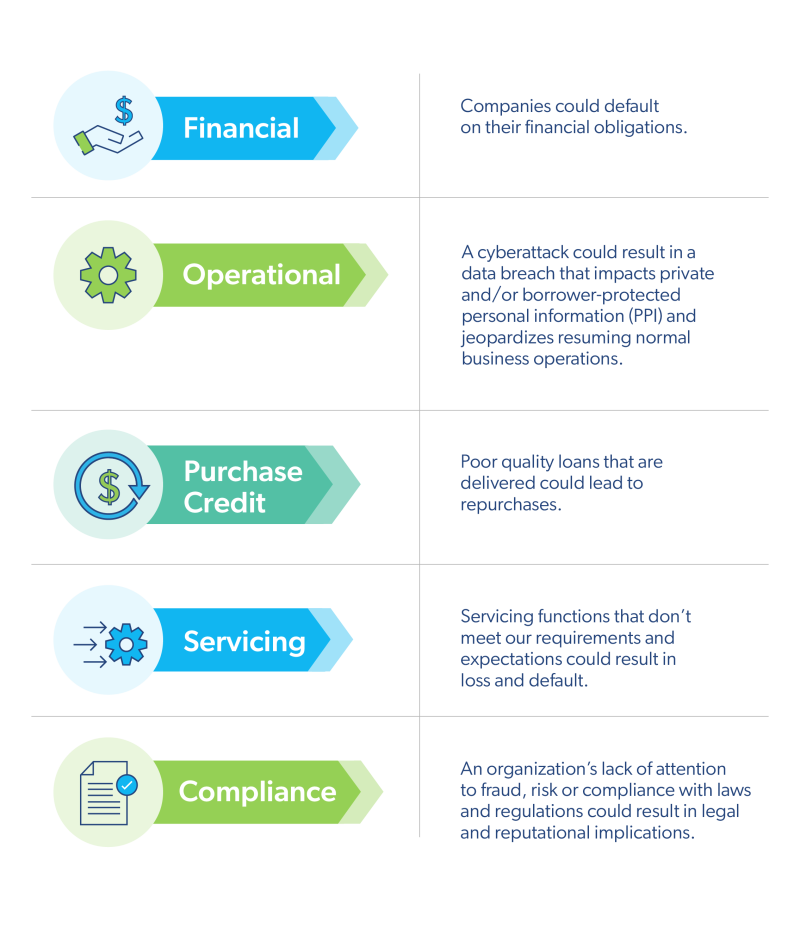Realizing the Benefits—While Mitigating the Risks—of Counterparty Relationships

By Pawan Singh, Senior Director, Third Party Oversight and Governance, Freddie Mac Single-Family
Freddie Mac relies heavily on third parties, including mortgage originators and Servicers (“Seller/Servicers”), that originate and sell investment-quality mortgages to us so we can continue to fulfill our mission of providing liquidity, stability and affordability to the housing market.
But maintaining these strong relationships must be balanced with sound risk management practices, including during mergers or when lenders sub-contract parts of the loan manufacturing or loan servicing process to additional parties. Single-Family Seller/Servicer Guide (Guide) Section 2101.1(b) outlines how Seller/Servicers must agree to comply with Freddie Mac’s requirements—including those related to their counterparties. This framework helps all of us manage risk and ensure mutually beneficial relationships.
Third and Fourth Parties Serve Important Roles and Require Strict Adherence to Guidelines
With that framework in place, we lean into our third parties for their efficiency and expertise in helping us successfully conduct our business, including:
- Seller/Servicers: Sellers originate and sell mortgages to us, while Servicers perform the day-to-day servicing functions for the mortgages Freddie Mac purchases, including collecting payments and helping distressed borrowers remain in their homes. We work with Sellers and Servicers of all sizes.
- Suppliers: These companies provide Freddie Mac with a product or service, like Dominion Virginia Power, which provides electricity to Freddie Mac’s buildings in Northern Virginia, or like Black Knight that provides mortgage lending software, data and analytics to Freddie Mac and our Seller/Servicers.
- Financial Market Utilities (FMUs): Financial entities provide us with the necessary infrastructure to transfer, clear and settle payments, securities and other financial transactions, like the Federal Reserve’s Fedwire Funds Service.
- Other Counterparties: These are third parties we directly face that don’t fall into one of the other three categories, including document custodians, mortgage insurance (MI) companies and reinsurers.
Similarly, Freddie Mac’s third parties also depend on their own third parties. Because we don’t have direct contracts with these fourth parties on whom we indirectly rely, we mitigate the risk of these relationships by imposing requirements and expectations on our third parties and taking action when required. Fourth party entities provide services directly to some of our third parties and therefore indirectly to Freddie Mac. These include:
- Secondary Market Advisors (SMAs), third-party vendors that perform secondary market services on behalf of a Seller, providing an efficient, end-to-end experience for conducting business with us.
- Asset and income modeler (AIM) service providers, which are Freddie Mac-verified third-party service providers of AIM-related capabilities.
- Software providers, which enable lenders to access certain Freddie Mac tools through integrated system interfaces.
We’re focused on improving our understanding of the ongoing risks associated with Seller/Servicer-related counterparties. In response to the Federal Housing Finance Agency (FHFA) Advisory Bulletin 2018-08—Oversight of Third Party Provider Relationships (AB), we’ve expanded on our data collection exercises. Select Seller/Servicers whom Freddie Mac has already contacted must submit information about their related third-party relationships via Freddie Mac’s Data Collection System (DCS) by July 31, 2024.

World Events and Market Conditions Require Continued Vigilance
Counterparty relationships are symbiotic ones, which must be carefully curated and continuously monitored. When a Seller/Servicer requires services provided by a vendor or company, any issues or concerns at that organization could have a material adverse impact on the Seller/Servicer and on our ability to meet our mission.
Risks ebb and flow depending on market conditions and global events. Recently, they’ve been increasing due to factors including:
- Cyberattacks on notable mortgage industry and financial companies, which have lately posed the biggest threat.
- The Russo-Ukrainian War and the Israel-Hamas War, which increase the likelihood of retaliatory cyberattacks against U.S.-based entities.
- Inflation, which could erode third and fourth parties’ profit margins and reduce their financial stability. Inflation can also decrease borrowers’ ability to make mortgage payments, resulting in increased claim payments for mortgage insurance (MI) company counterparties.
- Fraud schemes, which are always changing, evolving and becoming increasingly complex.
- Rapid rise in mortgage rates and home prices, which decreases mortgage origination volume, especially refinance volume, impacting the financial condition of mortgage originators.
- Artificial Intelligence (AI), which is a nascent technology necessitating ongoing strategies and methods to monitor.
Existing Counterparty Risks Can Be Minimized with Comprehensive Assessment
Eliminating potential counterparty threats isn’t logically feasible. However, they can be managed though continuous monitoring, relying on data, holistically assessing the likelihood of the risk in a thorough manner and tailoring the extent of work undertaken with a particular counterparty to that of the corresponding potential risk:

Freddie Mac’s Counterparty Operational Risk Evaluation (CORE) reviews are the principal method of evaluating the operational risk of our Seller/Servicers; these audits can also help us identify susceptibility to cyberattacks or fraud. The CORE team reviews the biggest Seller/Servicers on a cycle basis and provide us with insight into the maturity of our counterparties’ processes and whether they’re well-managed.
In 2024, our counterparty focus is twofold. First, we’re enhancing governance over our Seller/Servicers to make sure we have a consistent and available aggregate view of risk. We’re focused on streamlining decision making by reducing our governance group to a handful of senior leaders, who tee up concerns and share sharp views on remedies we’ve applied in the past and make recommendations going forward. It’s a very prescriptive approach. We’ve also made sure there’s clear accountability on who owns the Seller/Servicer relationship, making any remediations a highly structured, rigorous process with documented controls.
Secondly, we’re modernizing the CORE end-to-end process into much more of a value-added function. While we’re still completing comprehensive reviews for our larger Seller/Servicers, we’re also moving towards a more nimble and speedier approach by onboarding highly specialized team members with specific risk competencies and deploying them on site to assess specific risks. Since these specialized members provide us with a direct path to subject matter experts and connection points, we’re able to leverage them to strengthen escalations.
Although we already have a robust third- and fourth-party risk management framework, we continue to proactively test and enhance it to address new and emerging risks. This is paramount so we can continue to effectively leverage our counterparties and their service providers and make home possible for borrowers during all market conditions.
We’re committed to ensuring we’re addressing mutual business interests and covering all bases in assessing potential risks across the loan production spectrum. Learn more about Freddie Mac’s CORE review process.